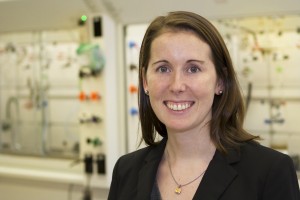 Q: How is creativity important to your work as a scientist?
Q: How is creativity important to your work as a scientist?
A: Creativity is everything in science. As a chemist, I try to answer questions that haven’t been answered before: How can sunlight stimulate a catalyst to produce fuel? How does the catalyst go about rearranging chemical bonds in feedstocks to produce more energy-rich molecules? Why does one catalyst react a thousand times faster than another? I’m asking these questions about molecules and materials that are on the scale of one-billionth of a meter, so to extract the how’s and why’s I need to be creative in my interrogation techniques. Generally, I need to identify ways to perturb my system in order to get a measurable response that can inform me of how the molecules are behaving. Measuring and interpreting these responses is like covertly intercepting and decoding an encrypted message, and creativity is critical for success!
Q: What gets your creative juices flowing?
A: For me, creativity flows when I interact with other scientists, whether it be a meeting with my students about recent results, a weekly meeting with the researchers in the Energy Frontier Research Center, discussing the latest advances in my field with other scientists at a conference, or spending a day visiting a chemistry department at another university. I always walk away from these interactions with enthusiasm, excitement and new ideas.
Q: What’s your biggest “fail?” How and what did you learn from that experience?
A: I think failure is what engenders creativity in science. When trying to solve a problem, I tend to go for the most obvious and straightforward solution first. These approaches are familiar, and usually tried-and-true, but for the most challenging problems, they usually don’t work! When they fail, I’m forced to think of a more unprecedented approach, and these avenues are the ones that lead to advances in science.
Jillian Dempsey
Assistant Professor of Chemistry
Recipient, 2015 Packard Fellowship in Science and Engineering, awarded to highly creative researchers early in their careers, and 2016 Sloan Research Fellowship, given to early-career scientists identified as “rising stars”
